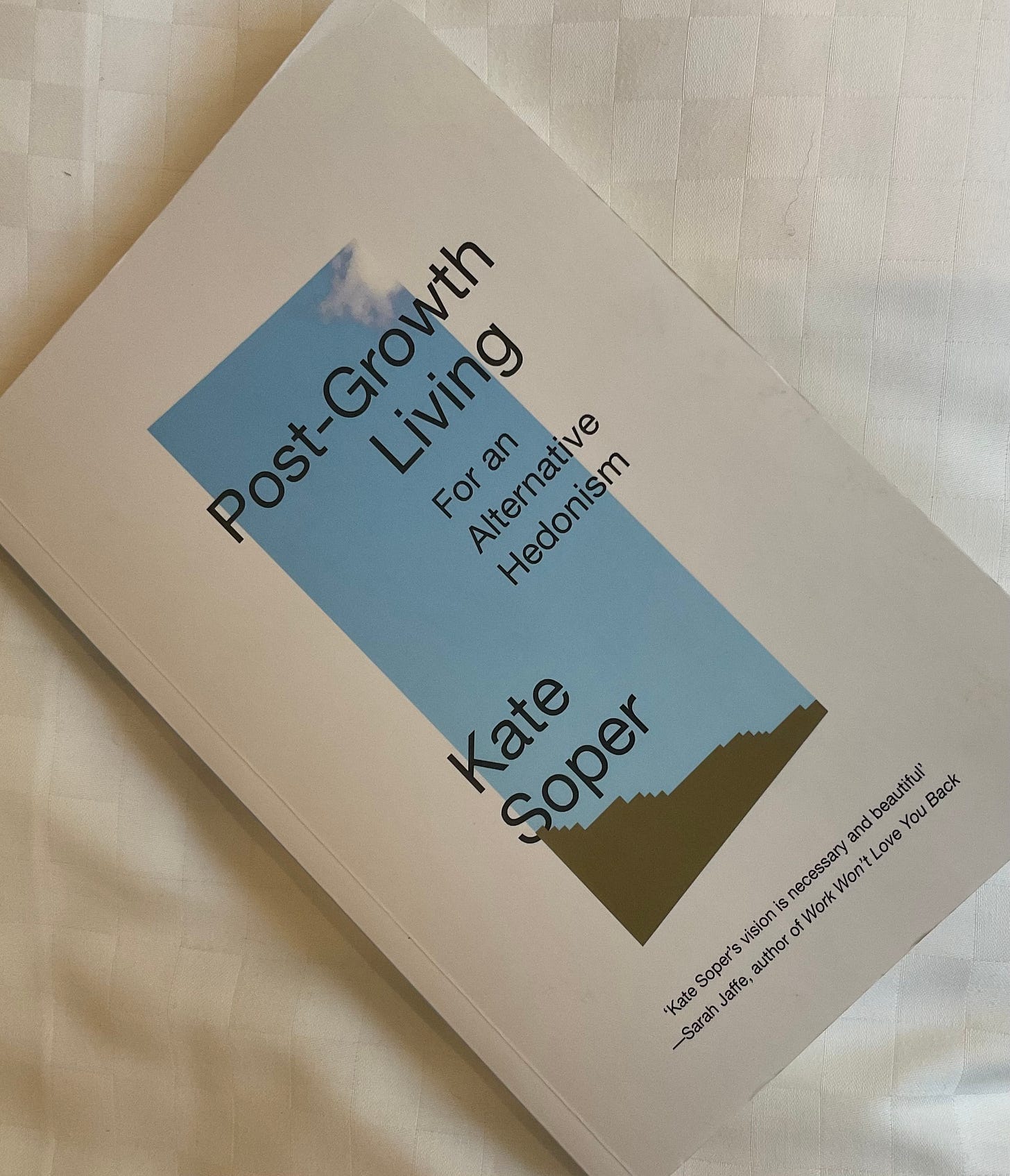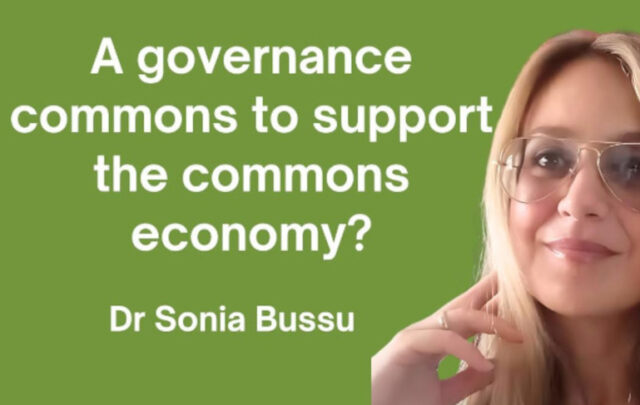A review of Kate Soper’s book ‘Post-Growth Living: For an alternative hedonism’.
Obviously we need to stop pretending that we are going to fix climate change without some changes in behaviour by consumers in the global North. Usually this is an outcome that is described as politically unacceptable because it is portrayed as wearing hairshirts and eating a diet of nothing but nettle leaves.
But it is not as if consumer capitalism is offering particularly good outcomes, even for those who have done well out of it. Debt levels are high, depression and and mental illness are increasing, we see an increasing number of consumption-based health effects, from obesity to allergies. This is all in the present, even discounting the terrible medium to long term effects if carbon emissions push us above 1.5 degrees of warming.
And if you give people the chance to work less without impoverishing themselves, they generally take it. So I have been wondering idly for a while if there are ways to propose lifestyle changes that make people happier and better, and also reduce their consumption and their emissions.
Reconstructing human culture
Fortunately for me the philosopher Kate Soper has been wondering about this less idly than I have, in her book Post Growth Living: For An Alternate Hedonism. (The book was published in 2020: the paperback is recently out. Thanks to Ian Christie for the prompt.)
(Photo: Andrew Curry. CC BY-NC-SA 4.0)
She sets out the issue reasonably succinctly early on.
(G)reen thought and writing, hitherto overly centred on the depletion of the natural world, now needs to focus less on the destruction of nature and its impact on a—supposedly unreformable—consumerist way of living, and more on human political culture and its reconstruction. (p13).
Pleasures to be gained
And after that there are a couple of chapters of position squaring, where she teases out differences between her intended argument and other ‘green/red’ critics of capitalism, and then reminds us of the scale of the climate emergency. It’s necessary work, of course, in a critique like this, and chapter 2 is a useful review of current critiques of capitalism, but the argument doesn’t get started until around page 50:
alternative hedonism dwells on the pleasures to be gained by adopting a less high-speed, consumption-oriented way of living. Instead of presaging gloom and doom for the future, it points to the ugly, puritanical and self-denying aspects of the high-carbon lifestyle in the present… Its advocates believe that new forms of desire—rather than fears of ecological disaster—are more likely to encourage sustainable modes of consuming. (p50)
Soper doesn’t use the phrase “weak signals”, but in effect that is what she is describing when she discusses the practices of alternative hedonism. She borrows a phrase from the Marxist critic Raymond Williams, “structures of feeling”, to describe that sense that change is happening even if it is not yet appearing in the data.[1] (Williams’ contemporary, the pioneering French ‘red-green’ thinker Andre Gorz also gets dragged into the light here, which is always welcome.)
Fulfilling needs
The weak signals unfold here, more or less, in a set of chapter sub-headings: streets that have been reclaimed from the car; a more local world; having less need for new stuff (the fast fashion industry gets a beating from time to time); and owning less and sharing more.
That’s all very well, but consumerism does also fulfil needs, whether we like it or not. Yes, some consumerism is a result of the way that our economic systems work, supported by the vast expensive structures of our advertising and marketing industries, no matter what advertisers tell themselves when they look in the mirror in the morning.
(As an aside here, she critiques the notion of the ‘Anthropocene’ as a label for our current era on the grounds that it implies that all humans are responsible, when we know that in practice it has been a subset of humans engaged in a particular economic system.)
Social affirmation
On the other hand, credible researchers like Colin Cooper and Daniel Miller argue that consumerism helps to construct meaning (I’d say: for those who can afford it). It’s also a source of social affirmation and approval. So:
Sustainable alternatives to it would also have to provide for distinctively human forms of need, and meet our appetite for novelty, excitement, distraction, self-expression (p56).
One of the ways of thinking about this, given that humans behave in mimetic ways, and consumption in particular is a mimetic behaviour, is how to frame those attributes of ‘alternative hedonism’ so they attract mimetic behaviour, through social emulation, even forms of social status.
It’s hard to separate consumption from work, and Soper has a chapter on this. On work, we seem to be in a world (I am paraphrasing wildly) where either you take your whole brain to work, or your emotions, or just your body. The second category includes care workers, but also retail and food service workers. In the last case I’m thinking of the algorithm-controlled workers in Amazon warehouses. Only the first of these has power in the labour market. Large amounts of this work is unproductive.
More time and less stuff
Soper engages sceptically with the left technofuturists who maintain that we can reduce labour by increasing the use of technology, mostly in discussing Srnicek and Williams’ book Inventing the Future. (Aaron Bastani’s Fully Automated Luxury Communism which is the doyen of this argument, came out at about the same time as Soper’s book).
What I took from her argument here was that while her proposal adds up to choosing to have more time, and less stuff, the tech-enabled argument about work is as likely to entrench existing power relationships as to lead to radical reductions in working hours. The evidence from the four day week seems to suggest that the time gains there are to do with workflows rather than technology.
At the heart of the argument, then, people need more time of their own—more ‘life’, less ‘work/life balance’—and we need a different politics of consumption:
Clean air, fertile soil, unpolluted water, a climate no longer over-heating: these wider goods are elemental conditions of life and health which cannot… be preserved only for the rich while allowed to be destroved for the poor. Unspoilt countryside, space in the city where people can move about and gather unharassed by cars: these pleasures, too, are not enjoyed only by a particular class. (p175)
Public goods
These are all, effectively public goods, which everyone benefits from, regardless of social class or income. In short then, we are talking about a shift from private consumption to shared consumption.
All of this implies a political programme, and she sets this out in a set of headings, for a British context. Since almost all of the political changes in the British Labour Party have been retrograde since she wrote the book, the only parties that seem to have an interest in this agenda at the moment are the Greens and the Welsh Labour Party.
But it comes in four parts:
- Citizenship and consumption: reversing the long Thatcherite project of defining citizens as a set of consumers, of both private and collective goods (such as health).
- Well-being without consumption: both curbing the production of goods and services that are contributing to runaway climate and change, and and enabling ‘social’ consumption that also contributes to well-being.
- New views of work: yes, some kind of Green New Deal is essential, and this should be coupled with the encouragement of forms of work that support greater equality and participation. (I would also add here the importance of reducing the amount of time taken up by work.)
- Restoring and reclaiming public space: we need to find ways of reclaiming for the public interest land that has been privatised over the past several decades. Transparency over who owns what would be a valuable place to start.
Looking for a new language
Reading this back, it seems to me like a programme which, if well articulated, could resonate with people who have had close to two decades of a low growth wage squeeze, and who have watched their public resources wrecked by austerity. (Quite apart from creating a positive story about the response to climate change).
 “Economic growth”, 1880-2019. Source: Google Ngram
“Economic growth”, 1880-2019. Source: Google Ngram
If I have an issue with the book, it’s in the title. The idea of “economic growth” is largely a post war construct, but right now it is one of the most deeply held notions of our time, and there are whole structures of political economy designed to prop it up. The mildest suggestions that it might not continue bring economists out in packs to hunt down the heresy.[2] But the climate emergency means that our choice is between managed degrowth and some form of unmanaged social collapse.
Using the word “growth”falls into George Lakoff’s framing trap: using your opponent’s language to attack their most strongly held ideas never works. So: if we are going to manage to consume less, we definitely need a new language for it.
—
[1] In an endnote, Soper explains that ‘structure of feeling’ refers “to emergent or pre-emergent responses or qualitative changes of affect that, in Williams’ phrase, ‘do not have to await definition or rationalisation before they exert palpable pressures and set effective limits on experience and on action’”. It was used by Williams in Marxism and Literature (1977).
[2] There are honourable exceptions. Diane Coyle pops up on Twitter from time to time to remind us that ‘GDP is only an idea.’
—
A version of this article is also published on my Just Two Things Newsletter.






